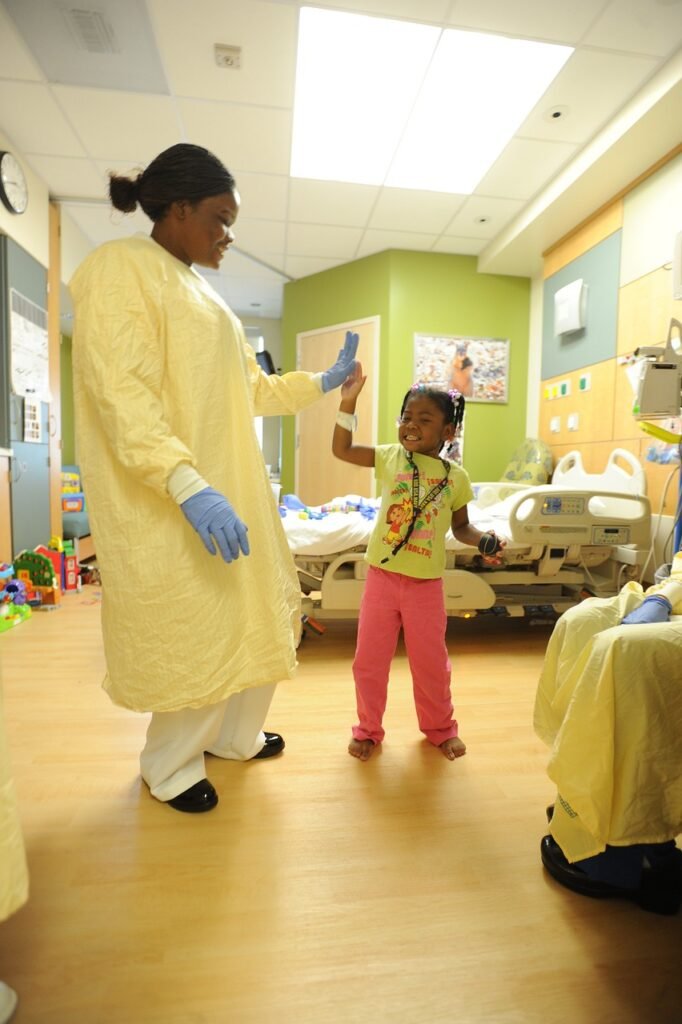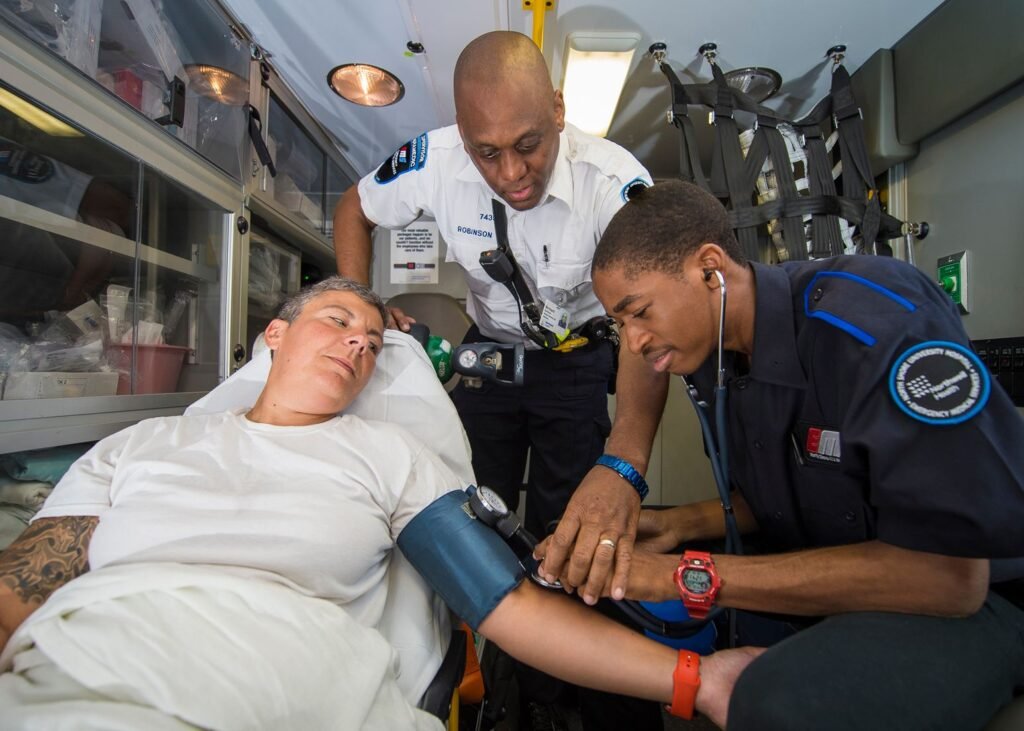Day in the Life of a Nurse: Exploring Daily Routines and Challenges
As a nurse, my days are filled with a diverse set of responsibilities and challenges, making each day unique and rewarding in its own way. Having worked in various specialties, as nurses we play a crucial role in the healthcare system. Providing patient care, collaborating with multidisciplinary teams, and continuously learning to keep up with advancements in this dynamic field can be crucially challenging.
My daily routine often includes tasks such as administering medications, monitoring vital signs, and assisting with diagnostic procedures. Aside from these clinical duties, I also engage in interdisciplinary teamwork with surgeons, physicians, specialists, assistants, technicians, and many other health care providers to ensure the best possible care for our patients.
Depending on the specialty, nurses may face unique challenges in their day-to-day work, such as managing high-stress situations, prioritizing complex patient needs, and adapting to constantly changing work environments. Despite these challenges, I believe the dedication, compassion, and resilience demonstrated by nurses are some of the many factors that make this profession truly remarkable.
The Fundamentals of Nursing
Roles and Responsibilities
As a nurse, my daily routines and challenges vary depending on the specialty I am working in. However, there are fundamental roles and responsibilities that are consistent across the board. First and foremost, my main responsibility is to provide quality care to my patients, while collaborating with other multidisciplinary healthcare professionals such as physicians, surgeons, and technicians.
Some of the key duties I perform include:
- Assessing patients’ health conditions and needs
- Developing and implementing care plans
- Administering medications and treatments
- Monitoring and evaluating patients’ progress
- Educating patients and families on their conditions and how to manage them
Additionally, I am responsible for maintaining a safe and sanitary environment to protect both my patients and myself from potential infections.
The Nursing Process
The nursing process is a crucial aspect of my daily routines, as it provides a systematic approach to patient care. It consists of five main components:
- Assessment: I collect comprehensive information about the patient’s physical, emotional, social, and cultural needs. This involves performing physical exams, reviewing medical histories, and conducting interviews with the patients and their families.
- Diagnosis: Based on the assessment, I identify the patient’s nursing diagnoses – the health problems and needs requiring nursing interventions.
- Planning: In collaboration with other healthcare professionals, medical plans, and the patient, I develop a tailored care plan that highlights the specific nursing interventions, goals, and timelines needed to address the identified diagnoses.
- Implementation: I execute the care plan by administering medications, providing treatments, and offering education and emotional support to the patients and their families, as necessary.
- Evaluation: Regularly, I review the patient’s progress and the effectiveness of the nursing interventions. This helps me adjust the care plan as needed, ensuring the best possible outcomes for the patients.
In conclusion, a day in the life of a nurse involves a wide range of roles and responsibilities, as well as adherence to the nursing process. These fundamentals ensure that I can provide the best possible care to my patients while overcoming daily challenges that arise in various specialties.
Daily Routines of a Nurse
Shift Preparation
As a nurse, I always begin my day by preparing for my shift. This involves gathering necessary supplies, reviewing my patient list and their medical charts, and taking note of any important updates or concerns. I often have a quick briefing with the outgoing nurse to discuss any significant events or changes in the patients’ conditions.
During this preparation, I also familiarize myself with the multidisciplinary team members I’ll be working with. This team typically includes surgeons, physicians, specialists, assistants, technicians, and other health care providers.
Patient Care Procedures
Once I am ready for my shift, it’s time to focus on patient care procedures. From assessments to medical treatments, my day revolves around ensuring patients receive the best care possible.
- Morning Rounds: I start my day by visiting each patient, conducting head-to-toe assessments, and addressing their needs. This may involve helping them with activities of daily living (ADLs) or simply offering a listening ear.
- Medication Administration: As a nurse, administering medication is a critical task. I confirm the correct medication, dosage, and time for each patient while ensuring proper documentation.
- Treatment Procedures: My day may also consist of performing various medical treatments, such as wound care, IV therapy, or assisting with diagnostic tests, based on the specialties and needs of the patients under my care.
- Collaboration and Communication: Throughout the day, I collaborate with the multidisciplinary team to discuss treatment plans and updates on patients’ conditions. This communication is essential to ensure optimal care for our patients.
As a nurse, each day brings unique challenges and opportunities. Facing these challenges and providing exceptional patient care is truly rewarding for me and my health care team.
Challenges in Nursing

Emotional Stress
In my experience as a nurse, one of the most significant challenges faced is emotional stress. I encounter patients with varying degrees of illness daily, some of whom may not recover despite my best efforts. Factors such as compassion fatigue and PTSD can contribute significantly to emotional stress among nurses, particularly during pandemics like COVID-19 when the number of patients in critical condition is high.
As a nurse, I am not immune to the emotional challenges that come with the job. Providing emotional support to patients and their families can be extremely draining. Additionally, dealing with instances such as patient death, suffering, or family conflict can leave a lasting impact, making it essential for me to find healthy ways to cope with this stress.
Physical Demands
Nursing also presents various physical demands that can be challenging. The nature of the work often requires me to be on my feet for extended periods, which can take a toll on my body. Tasks such as assisting patients in and out of bed, transferring patients, and administering treatments can all contribute to physical strain.
In addition to the physicality of the work, nurses are also at risk for workplace injuries, such as backaches and sprains, due to the need to lift or move patients frequently. The irregular work schedules, including long shifts and overnight hours, can also affect my energy levels and overall well-being.
My experiences have taught me the importance of self-care and finding the right balance to help overcome the challenges that come with being a nurse. By acknowledging the emotional and physical demands and seeking the necessary support, I am able to continue providing high-quality care to my patients.
Nursing Specialties Overview
As a nurse, I have observed that there are various nursing specialties, each providing unique opportunities to care for patients with different needs. In this section, I will discuss three main nursing specialties: Critical Care Nursing, Pediatric Nursing, and Oncology Nursing.
Critical Care Nursing
Critical Care Nursing involves working with patients who are critically ill in highly demanding settings such as Intensive Care Units (ICUs), surgical units, or Emergency Departments (EDs). These nurses require advanced skills, as they often monitor complex life-support systems, rapidly assess and respond to patients’ changing conditions, and, most importantly, provide life-saving care to those who need it most. A Day in the Life of a Nurse highlights the importance of teamwork among multidisciplinary teams, including surgeons, physicians, specialists, and technicians in caring for critically ill patients.
Pediatric Nursing
Pediatric Nursing focuses on the care of children, from infancy to adolescence. As a pediatric nurse, I have witnessed the emotional demands of caring for young patients and their families. These nurses need to be well-versed in growth and development milestones, recognize early signs of illness, and provide education to parents and caregivers regarding the care of their child. They could work in various settings, such as hospitals, physician offices, or schools. To provide the best care for children, pediatric nurses should be compassionate, empathetic, and patient.
Oncology Nursing
Oncology Nursing is the specialization of caring for patients with cancer. Oncology nurses not only administer cancer treatments such as chemotherapy and radiation but also assess their side effects, offer emotional support, and educate patients on their condition. Oncology nurses must be able to understand various types of cancer and their treatments to provide individualized care to their patients. They often collaborate with a multidisciplinary team of healthcare professionals, such as oncologists, radiologists, and surgeons, to ensure the best care for the patient.
Each nursing specialty presents its unique challenges and opportunities. Choosing a nursing specialty, such as Critical Care Nursing, Pediatric Nursing, or Oncology Nursing, allows me to tailor my knowledge and skills, focus on a specific patient population, and ultimately make a difference in the lives of those I serve.
Time Management in Nursing

One challenge I face as a nurse is effectively managing my time. Time management plays a crucial role in the lives of nurses, as it directly impacts patient care and overall work-life balance. I’ve noticed that as a nurse in various specialties, managing time can differ depending on the tasks involved.
In any nursing environment, prioritizing tasks is key. I start by identifying the most critical tasks, such as administering medications, dressing wounds, or responding to emergencies. Next, I allocate time to administrative tasks like charting and coordinating with other healthcare professionals. Lastly, I’m aware of any downtime I might be able to use for personal needs or professional development opportunities.
To assist in managing tasks, I utilize technology to my advantage. From electronic health records to communication apps, these tools help me save time and streamline processes. Keeping myself updated with new technology in nursing is essential in maintaining efficiency.
Another effective time management skill I practice in nursing is delegating tasks appropriately. Recognizing that healthcare is a team effort, I make sure to collaborate with my fellow nurses and other healthcare professionals to achieve the best possible care for our patients. Asking for help or advice from more experienced colleagues is always a valuable learning experience for me.
Furthermore, I’ve learned the importance of adaptability and flexibility in nursing. Unforeseen events can momentarily change my priorities or require me to reallocate my time. Being able to quickly adjust to new situations without getting flustered has helped me handle daily challenges more efficiently.
Lastly, I make sure to practice self-care to ensure that I am in my best state to take care of others. This includes proper meal breaks, hydration, and regular time off to recharge. Integrating time management strategies has proven to be beneficial not only for my nursing career but also for my personal life.
Interdisciplinary Collaboration
In my nursing career, I have come to appreciate the importance of interdisciplinary collaboration in ensuring the effective delivery of patient care. Working with a team of healthcare professionals from diverse backgrounds, such as physicians, pharmacists, and occupational therapists, has allowed me to improve patient and family experiences while enhancing the workplace environment.
I believe that the key to successful interdisciplinary collaboration is open communication and a common goal of providing patient-centered care. Through my experience, mutual respect and understanding of each team member’s professional roles and expertise contribute to our ability to optimize patient outcomes.
Some common scenarios where I’ve found interdisciplinary collaboration to be vital include:
- Complex Case Management: When a patient has multiple, complex health issues, an interdisciplinary team helps create a comprehensive care plan that addresses all aspects of the patient’s needs.
- Discharge Planning: Interdisciplinary collaboration facilitates safe and effective transitions from hospital to home or other care facilities, ensuring that all aspects of a patient’s care are managed.
- Chronic Conditions Management: Patients with chronic conditions often require care from multiple healthcare professionals, which necessitates regular and clear communication amongst team members.
I also attribute the success of interdisciplinary collaboration to the ongoing development of core competencies for all team members. Through various continuing education programs and professional development opportunities, my knowledge and ability to work collaboratively have grown.
In conclusion, interdisciplinary collaboration has shaped my nursing practice by fostering a culture of teamwork and respect among healthcare professionals. Together, we can provide patient-centered care that improves patient outcomes and enhances the workplace for team members.
Adapting to Different Patient Needs

As a nurse, adapting to different patient needs is vital in providing excellent care. This involves acknowledging and embracing the diverse backgrounds and requirements that patients present. Within this context, two critical aspects to consider are cultural sensitivity and age-specific care.
Cultural Sensitivity
In my nursing practice, I always make an effort to be culturally sensitive and aware. Patients come from various cultural backgrounds, and recognizing those differences is essential to provide compassionate and informed care. This includes taking the time to learn about the patient’s beliefs, customs, and traditions that may impact their treatment or interactions.
- Personalizing care: Build trust by addressing patients using their preferred names and titles.
- Language barrier: Utilize interpreters, if needed, to ensure clear communication.
- Dietary considerations: Respect religious or cultural food restrictions when providing meals.
Age-Specific Care
Another crucial aspect of adapting to different patient needs is providing age-specific care. Each age group has unique challenges and needs that need to be addressed in order to offer the most appropriate care:
- Newborns and infants:
- Gentle handling and comforting techniques.
- Monitoring vital signs and development milestones.
- Guiding parents and caregivers on proper infant care.
- Pediatrics:
- Establishing rapport and providing age-appropriate explanations.
- Collaborating with parents or caregivers in the plan of care.
- Identifying and managing common age-specific illnesses.
- Adolescents:
- Fostering open communication and respecting privacy.
- Addressing mental health and educational concerns.
- Providing guidance on age-specific health issues, such as substance use.
- Adults:
- Engaging patients in shared decision-making process.
- Monitoring and managing chronic health conditions.
- Prioritizing and addressing preventative care measures.
- Older adults:
- Assessing and adapting the care environment for safety.
- Encouraging independence and autonomy.
- Coordinating with multidisciplinary teams for comprehensive care.
In conclusion, as a nurse, adapting my care approach to accommodate the diverse needs of my patients is a vital aspect of my daily routine. By practicing cultural sensitivity and providing age-specific care, I can better support the individuals I serve and help them achieve better health outcomes.
Handling Emergencies and Critical Situations

As a nurse, I am often faced with emergencies and critical situations. Regardless of my specialty, my ability to retain composure and act swiftly is crucial in these instances. During such moments, I follow a series of steps to provide the best possible care.
First and foremost, I stay calm and assess the situation. I take a deep breath and quickly evaluate the severity of the problem. This step helps me determine the most appropriate course of action and prioritize my interventions.
Then, I communicate with the multidisciplinary team, which consists of surgeons, physicians, specialists, and technicians. As a cohesive unit, we work together to create a patient-centered plan and execute it efficiently. Maintaining open lines of communication ensures a consistent approach and shared goals among all team members.
In addressing emergencies, my clinical skills play a vital role. I often need to administer medications, perform lifesaving procedures, or assist with surgical interventions. My ongoing commitment to professional development and staying current with medical advancements allows me to provide high-quality care in these critical moments.
As I navigate through challenging situations, I also encounter ethical dilemmas and situations that can cause moral distress. To manage this aspect, I rely on my personal and professional support networks, engage in reflective practices, and maintain a strong commitment to my core values.
To summarize my approach to handling emergencies and critical situations, I:
- Remain calm and assess the situation.
- Communicate effectively with the multidisciplinary team.
- Apply my clinical skills and knowledge.
- Address ethical dilemmas and moral distress.
By adhering to these principles, I am able to fulfill my role as a nurse and provide quality care to my patients in a range of emergency and critical situations.
Professional Development in Nursing

As a nurse, I recognize that professional development is essential for maintaining expertise in our ever-evolving field. Continuing professional development (CPD) plays a central role in keeping our knowledge and skills up-to-date, so I prioritize dedicating time to self-directed learning or participating in organized training programs. I have found that CPD helps me better serve my patients, adapt to changes in healthcare systems and policies, and achieve personal career goals. Studies on nurses’ experiences with CPD have shown that many of us share this belief and actively engage in a variety of educational activities.
There are several strategies that I utilize for advancing my knowledge and skills within the nursing profession. Some of these include:
- Attending conferences and workshops: These events offer valuable opportunities to learn about the latest advances in clinical practice and network with peers from various specialties. I often return from conferences feeling re-energized and motivated to implement new ideas in my daily practice.
- Participating in online courses and webinars: Online learning has become increasingly popular due to its flexibility and convenience. There are many reputable sources that offer high-quality courses, such as StatPearls, where I can earn continuing education credits while expanding my knowledge on my own schedule.
- Engaging in professional reading: Staying informed about the latest research and evidence-based practices is crucial. I subscribe to nursing journals and follow related social media accounts to stay up-to-date on new findings and trends in the industry.
- Pursuing advanced education and certifications: Earning higher degrees or specialized certifications can not only improve my clinical competency but also enhance my career prospects. Pursuing advanced education may involve enrolling in a degree program or seeking certification from recognized nursing organizations.
In my experience, the most significant challenge of professional development is finding the time and resources to prioritize learning amidst a busy schedule. However, I realize that investing in my growth and development ultimately contributes to better patient outcomes and a more fulfilling career. We, nurses, must remain committed to lifelong learning and embracing opportunities that advance our expertise and elevate the nursing profession as a whole.
Work-Life Balance in Nursing
As a nurse, it’s essential to find a healthy work-life balance to ensure long-term mental and physical well-being. Maintaining a balance between work and personal life has become increasingly important, especially as the demands on modern nurses grow more complex and challenging. In my experience, there are several strategies I use to maintain this delicate balance.
Firstly, I prioritize my time by dividing tasks into urgent and non-urgent, and essential and non-essential. This way, I can allocate my time and energy to tasks that truly matter and avoid burnout. I make sure to schedule time for self-care, whether it’s a short walk, a workout, or even a brief meditation session. As a recent article suggests, paying attention to one’s emotions and energy levels is essential in detecting early signs of an imbalanced work-life situation.
Creating a support network with colleagues, friends, and family has proven invaluable in my pursuit of a balanced life. Sharing experiences and discussing challenges and successes not only helps me feel connected but also encourages me to ask for assistance when needed. In the nursing profession, working long hours may sometimes be unavoidable. However, learning to assert boundaries and communicate with my supervisors and colleagues about my availability has proven helpful in managing my work-life balance.
Flexibility in my work schedule is another critical factor in achieving balance. Depending on the nursing specialty, this may be more or less feasible, but seeking opportunities for flexibility, such as swapping shifts or working part-time, can significantly reduce stress. In addition, many organizations around the world are taking steps to promote work-life balance, which could lead to more nursing roles offering flexibility.
In conclusion, balancing work and personal life is vital for nurses, as it ensures their mental and physical health, allowing them to provide high-quality care for their patients. Through prioritizing tasks, practicing self-care, seeking support, setting boundaries, and pursuing flexible work options, I have managed to find a balance that allows me to excel in my profession and fully enjoy my personal life.
Frequently Asked Questions
What are the essential duties that constitute a nurse’s daily routine in a hospital setting?
In a hospital setting, my daily routine as a nurse includes checking patient stats and recording them in patient charts, administering medications, assessing injuries or emotional states, and triaging patients to the appropriate departments1. I also review patient lab reports and educate patients on their homecare requirements2.
How does the day-to-day experience of a nurse vary between different medical specialties?
The day-to-day experience as a nurse can greatly vary depending on the medical specialty. For example, an ER nurse would handle more urgent and critical cases, whereas a pediatric nurse would work with infants, children, and adolescents. Each specialty requires a tailored knowledge base and skill set, which in turn influences the daily tasks and responsibilities.
What challenges do nurses encounter on a regular basis in their professional field?
Some of the challenges I face as a nurse include managing a high workload, dealing with emotionally charged situations, maintaining effective communication across multidisciplinary teams3, and staying up to date with the latest medical knowledge and best practices. Additionally, self-care is vital in order to provide high-quality care and maintain personal well-being4.
Can you outline the typical shift structure for a nurse working in a hospital ward?
The typical shift structure for a nurse working in a hospital ward can vary, but most day shifts occur between 7 am and 3 pm5. This is when the majority of the hustle and bustle happens, with non-emergency surgeries taking place, physicians ordering lab tests, and patients having visitors. Night shifts usually involve monitoring patients, administering medications, and providing patient care as needed.
What are the key responsibilities of a nurse during a standard 12-hour shift?
During a standard 12-hour shift, my key responsibilities as a nurse are to monitor and assess patient conditions, administer medications, perform wound care, communicate with physicians and other healthcare providers, and engage in patient education as needed. Additionally, I need to prioritize tasks, update patient records, and coordinate patient care with the rest of the healthcare team.
How does a nurse prioritize and manage their workload throughout their shift?
As a nurse, I prioritize and manage my workload by assessing the urgency and importance of tasks at hand. I continuously update the plan of care based on patient needs and make time-sensitive decisions to ensure the best possible outcomes. Furthermore, I effectively communicate and collaborate with my fellow nurses and healthcare team members to provide the best possible patient care.









[…] across various specialties. One area where nurse practitioners are often involved is in the labor and delivery process. The question arises, can nurse practitioners deliver […]